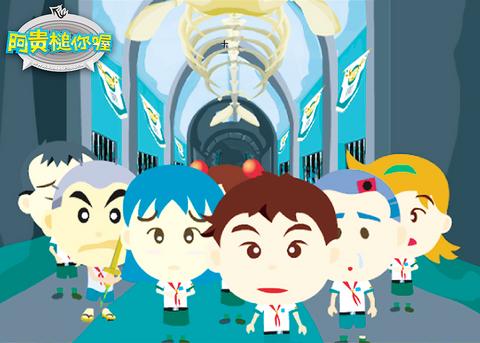Last year was a good one for Taiwan's animation fans. A-Kuei (阿貴), the online animation series, launched its Japan and China Web sites. It also launched a theme restaurant on one of Taipei's busiest streets. Foul-mouthed Dragon, another online animation with a talent for singing, also released his first album.
Their popularity has inspired many imitators including AniTime, of Hong Guang group (

PHOTO COURTESY OF SPRING HOUSE ENTERTAINMENT
Spring House entertainment (

PHOTO COURTESY OF CH1
In spite of the release of Foul-mouthed Dragon's second album Piss and Shit about Love (
The two companies only announced plans to bring their animation characters back to public attention this month.
A-Kuei's Gonna Hammer Your Head (
Ch1 will target the China market and has high hopes for 3D QQ, an online chatroom game to be released in January, in which Foul-mouthed Dragon will be one of the main stars.
Marketing virtual people
Both A-Kuei and Foul-mouth Dragon have been victims of piracy, but more significantly, they have the singular disadvantage of not having human foibles. Chiang Chang-hsieh (
"With online animation characters, the best way for them to thrive is a steady flow of new content rather than expensive promotional campaigns," Chiang said.
Even if that means slow development, Chiang is not worried. "I want to create a Snoopy. One single character that people still recognize 50 years later," Chiang said. "Characters like that may remain obscure for decades and then shoot to fame."
The early history of Walt Disney's Mickey Mouse has been a favorite reference for Chiang. Originally designed as a "bad guy" character, the sharp-nosed grizzly mouse evolved into a more human-looking and benign character over a period of five years. It took the now much "cuter" mouse another five years for its image to get accepted by the public.
Similarly, Foul-mouthed Dragon used to play a minor role next to Cute Dragon in an earlier animation series. It was his crude humor that pushed him into the foreground.
With broadband service becoming more widespread, the creators of the only two online animation programs that charge for their services are confident they will make steady progress.
Ch1 provided free animations when it started two years ago and began charging for some of the content on its Web site last year as it became more popular. ADSL users pay NT$10 for viewing of a short movie with a theme song. It now boasts of one million hits per month.
Online audiences
Spring House also offered free A-Kuei episodes until last year. It now claims 100,000 members accessing paid content and one million members in total. It charges ADSL users NT$5 per viewing.
Moreover, ADSL use has increased as fees have dropped, making the future of online animation promising.
"We are building our audience base around heavy Internet users who see online audio-visual services as an entertainment option," said Lee Wen-hong (
"For online animation characters to get popular and make a profit, merchandising is essential while charging users for viewing is only marginal," said Lin Yu-sheng (
Citing the example of Hamutaro, one of the latest popular animation characters, Lin said that Japan's animation industry's business savvy is worth learning from. Not only did Shogakukan, creator of the big-eyed hamster, market the merchandise along with the cartoon, it designed several different versions of the same hamster, thus multiplying the revenue from product. "At a later stage, an animation Web site becomes a platform for promoting the brand whose products bring in the major revenue," Lin said.
Broadcast in 14 countries, including Italy and the UK, Hamutaro's international exposure is the envy of animation makers in the small market in Taiwan. Although the grassroots humor of Foul-mouth Dragon and the smart world-play of A-Kuei have helped them appeal to local audiences, these qualities and frequent reference to Taiwanese culture will probably exclude foreign audiences.
"The images of A-Kuei family members appeal to a larger audience in general. However, it still needs a lot of improvement in its Flash quality and the development of characters. Moreover, it relies on detailed knowledge of Taiwanese culture for the audience to make sense of its content. This has to be changed before foreign audiences can appreciate it," said Lin.
The current popularity of things Chinese is something Taiwanese online animation can easily take advantage of. "As far as the Internet goes, it is viable to present things Chinese to foreigners, such as by blending martial arts into the plot," Lin said. That was the direction that Miluku, led by film director Edward Yang (楊德昌), was heading when it unveiled a new character based on Jackie Chan (成龍) in August. "To have a lasting international appeal, development of characters is always vital with or without the Chinese flavor," Lin said.
Targeting the Chinese market, Ch1 wants its characters not to have a nationality. "Snoopy appeals to everyone because people do not associate it with America or any other country. Without an apparent cultural identity, it alienates no one. The same is true of Hello Kitty. It could have been from any country," Chiang said.
When 3D QQ goes on store shelves in January and A-Kuei is Gonna Hammer your Head in December, they may win back the hearts of animation fans here. Whether these "local superstars" will take off from Taiwan and where they are going next still has everyone guessing.
One the Net:
Foul-mouthed Dragon can be found at http://www.ch1.com.tw
A-Kuei can be found at http://a-kuei.a-kuei.com.tw

One of the most important gripes that Taiwanese have about the Democratic Progressive Party (DPP) is that it has failed to deliver concretely on higher wages, housing prices and other bread-and-butter issues. The parallel complaint is that the DPP cares only about glamor issues, such as removing markers of Chinese Nationalist Party (KMT) colonialism by renaming them, or what the KMT codes as “de-Sinification.” Once again, as a critical election looms, the DPP is presenting evidence for that charge. The KMT was quick to jump on the recent proposal of the Ministry of the Interior (MOI) to rename roads that symbolize

On the evening of June 1, Control Yuan Secretary-General Lee Chun-yi (李俊俋) apologized and resigned in disgrace. His crime was instructing his driver to use a Control Yuan vehicle to transport his dog to a pet grooming salon. The Control Yuan is the government branch that investigates, audits and impeaches government officials for, among other things, misuse of government funds, so his misuse of a government vehicle was highly inappropriate. If this story were told to anyone living in the golden era of swaggering gangsters, flashy nouveau riche businessmen, and corrupt “black gold” politics of the 1980s and 1990s, they would have laughed.

It was just before 6am on a sunny November morning and I could hardly contain my excitement as I arrived at the wharf where I would catch the boat to one of Penghu’s most difficult-to-access islands, a trip that had been on my list for nearly a decade. Little did I know, my dream would soon be crushed. Unsure about which boat was heading to Huayu (花嶼), I found someone who appeared to be a local and asked if this was the right place to wait. “Oh, the boat to Huayu’s been canceled today,” she told me. I couldn’t believe my ears. Surely,

When Lisa, 20, laces into her ultra-high heels for her shift at a strip club in Ukraine’s Kharkiv, she knows that aside from dancing, she will have to comfort traumatized soldiers. Since Russia’s 2022 invasion, exhausted troops are the main clientele of the Flash Dancers club in the center of the northeastern city, just 20 kilometers from Russian forces. For some customers, it provides an “escape” from the war, said Valerya Zavatska — a 25-year-old law graduate who runs the club with her mother, an ex-dancer. But many are not there just for the show. They “want to talk about what hurts,” she